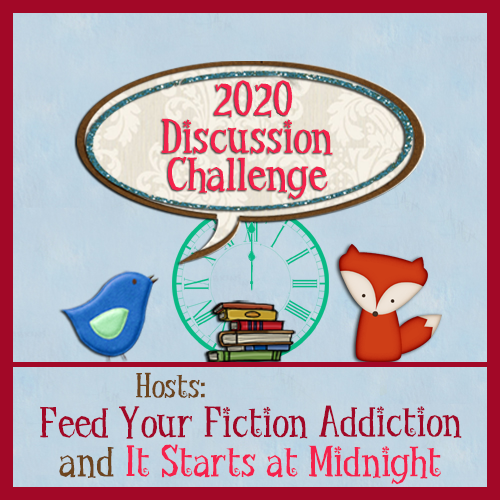
Thanks to these two bloggers for sponsoring the 2020 Blog Discussion Challenge:
- Nicole at Feed Your Fiction Addiction
- Shannon at It Starts at Midnight
You can join the discussion challenge at any time during 2020 by clicking on either link above.
Which is more important in fiction: plot or character? Novels that engage in complex characterization are often called character-driven stories or character studies, while books heavy on fast action and unexpected turns of events are called plot-driven novels. But even in character studies the characters still have to DO something (even if all they do is think), and even in plot-driven novels someone must be DOING all that action.
Plot and character are like love and marriage: You can’t have one without the other.
This is true no matter what kind of fiction you’re reading. Some people distinguish between literary fiction and genre fiction, a distinction in which the term genre fiction refers to format-specific categories such as mystery, thriller, science fiction, horror, and romance. The term is usually used pejoratively, to suggest that literary fiction is somehow better than “mere genre fiction.”
But all fiction requires characters who do something, and the best works of fiction, whether literary or genre fiction, hit the sweet spot of combining complex characterization with interesting plotting.
I gravitate toward mysteries and thrillers because I think that some of the most thought-provoking fiction—novels that explore the extremes of what the human heart is capable of—slots into those genres.
I often hear that crime fiction is just plot-driven entertainment—that unlike literary fiction, or even general fiction, it doesn’t examine the human condition. The truth is you can’t write crime fiction without examining the human condition and the society of a place or time. If a writer doesn’t understand the very elements that led someone to desperation, to the ultimate bad choice of taking another life, he can never write a convincing antagonist. Villains are not just bad people, they’re often in an untenable situation and see no other way out.
Dianne Freeman
Thriller author Karin Slaughter, when asked what makes for a good thriller, replied, “Character has to matter as much as plot. If they’re not equally strong, then no one really cares what happens.”
But while the question of whether character or plot is more important may be moot, the question of which comes first in an author’s writing process can yield some interesting results.
Queen of suspense Mary Higgins Clark reportedly scanned the New York City tabloids every morning looking for story ideas, a suggestion she was looking for unusual plot twists.
In contrast, Tana French begins with characters:
I don’t outline at all, actually. In fact, I can’t really figure out what’s going on myself until I’ve been writing the characters for a while. I don’t even know “whodunit” until I’ve been writing long enough to know who might kill someone, and for what reasons.
But in the end, plot and character work hand in hand.
For me, the best thrillers are a combination of plot and characterization. There is nothing better than a thriller I absolutely can’t put down. That said, it isn’t everything; I also want to feel something for the characters in the books I read. If I don’t, then ultimately I won’t care what happens to them in the end. They also need to feel authentic.
thriller writer Mary Kubica
Plot + character = story, and good stories keep us reading.
We read on because we love the characters but also because we want to know how the story plays out. There are mysteries to be solved here, genuine puzzles that keep us questioning to the very end.
Scottish mystery writer Val McDermid
© 2020 by Mary Daniels Brown


For me a story with lots of plot but no character development is empty and unsatisfying. I think it has less to do with describing the characters at length than with how real they are to the author. Just a few telling details can bring a character to life.
“Just a few telling details can bring a character to life.” I totally agree, Lory. We don’t need the character’s complete biography; we just need the details that shape how and why the character reacts in a certain way in this particular (plot) situation. Thanks for reading and commenting.
That perfect balance of plot and character is very tough to pull off, but when it works, magic happens.
Absolutely, Liz. And now that I think more about it, it often seems that timing is also important, i.e., when in the story the author drops in a relevant part of the character’s back story we need to understand the action the character is taking right now. Thanks for reading and commenting.
Yes, the decisions about where to break the chronology of ongoing time are critically important.
I agree with the idea that character is just as important as plot in a thriller, and I would argue that it’s true for pretty much all books. I’ve definitely read books that are too light on plot and I keep waiting for something MORE to happen, but I’ve also read books where I just don’t have a connection to the characters, no matter how exciting the action is. I’d say the latter might be even worse for me.
I like your concept of “a connection to the characters,” Nicole. For me, it doesn’t matter WHAT happens (plot) if I don’t understand why a particular character made a particular choice that caused it to happen. Thanks for reading and commenting.
I can take a book that’s more character driven with a thin plot, but a book where the plot is the central part with flat characters will turn me off.
I’ve always been a more-character-than-plot reader myself, Davida. The more inner life the better. Thanks for your comment.